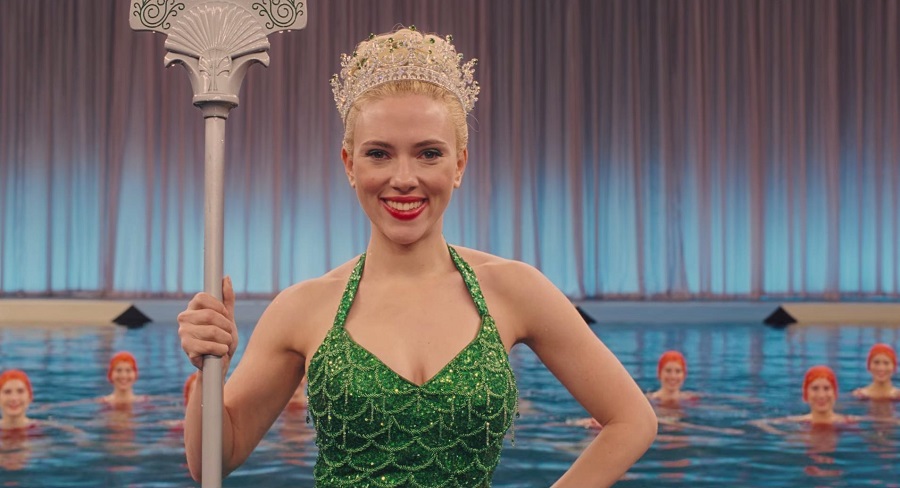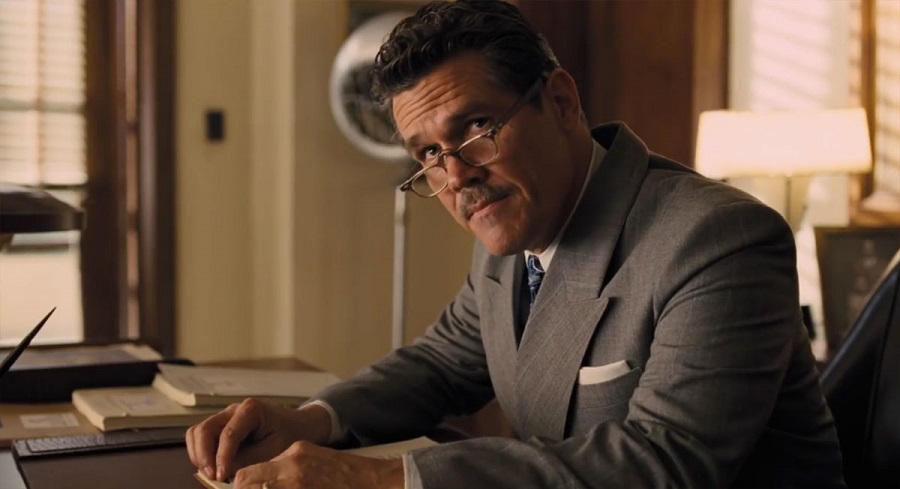Hail, Caesar! | reviews, news & interviews
Hail, Caesar!
Hail, Caesar!
George Clooney, Josh Brolin and Scarlett Johansson star in the Coens' Hollywood spoof

As a title, Hail, Caesar! is as delightfully self-conscious and “inside Hollywood” as The Hudsucker Proxy and O, Brother Where Are Thou? An alternative might have been It’s a Wonderful Lie.
Set in 1951, Joel and Ethan Coen’s satirical fantasy, a companion piece to Barton Fink, stars Josh Brolin as a fictional studio boss who doubles as a gumshoe to protect his company’s image from scandals. Among the stars who test his resolve are a dim matinee idol (George Clooney) kidnapped by a Communist cell modelled on the Hollywood Ten while playing a Roman officer in the eponymous biblical epic, a synchronised swimming star (Scarlett Johannson, pictured below) who’s unwed and unsure who recently impregnated her, and a hoofer-singer (Channing Tatum) who is secretly involved in the Cold War. The narration by Michael Gambon (sounding like Frank Langella) suggests the anonymous speaker is waving a nosegay.
 As satirical fantasies go, Hail, Caesar! is so loving and spectacular a celebration of the Hollywood studio system of the early 1950s that it looks like a riposte to 2006’s Hollywoodland. The Coens were able to buy bigger stars and better production values than Allen Coulter could on his underrated neo-noir, a sinister exposé of the crumbling Dream Factory that probes the suspicious death of TV “Superman” actor George Reeves in 1959. Hollywoodland is the more sourly trenchant of the two. The irony, of course, is that Hail, Caesar! suggests nothing less than a MGM snow job like The Great Ziegfeld – it’s a movie “about” the studio’s “fixer” Eddie Mannix that, back in the day, might have starred Robert Taylor or Walter Pidgeon and been personally supervised by Louis B. Mayer at his most sanctimonious.
As satirical fantasies go, Hail, Caesar! is so loving and spectacular a celebration of the Hollywood studio system of the early 1950s that it looks like a riposte to 2006’s Hollywoodland. The Coens were able to buy bigger stars and better production values than Allen Coulter could on his underrated neo-noir, a sinister exposé of the crumbling Dream Factory that probes the suspicious death of TV “Superman” actor George Reeves in 1959. Hollywoodland is the more sourly trenchant of the two. The irony, of course, is that Hail, Caesar! suggests nothing less than a MGM snow job like The Great Ziegfeld – it’s a movie “about” the studio’s “fixer” Eddie Mannix that, back in the day, might have starred Robert Taylor or Walter Pidgeon and been personally supervised by Louis B. Mayer at his most sanctimonious.
One of Tinseltown’s shadiest figures, Mannix (1891-1963) was officially MGM’s general manager and comptroller. Unofficially, he was a high-powered janitor, reportedly one with Mob connections, who did what he needed to do to keep the stars’ and filmmakers’ transgressions out of the press and the studio family-friendly in the public eye. Working with head of publicity Howard Strickling, he covered up same-sex relationships, murders, drunk-driver manslaughters, and rapes. Bob Hoskins plays him in Hollywoodland as a suited pitbull who, in one scenario imagined by the detective on Reeves’s case, had the actor murdered for inconveniently ending his affair with Mannix’s wife.
 Brolin’s Mannix (pictured left) – who only in his fixing overlaps with the original – is no animal but the humorless tough guy, almost smooth, who runs Capitol Pictures (which hired Barton Fink as a screenwriter) and is so grimly passionate about his work that he calls in a quartet of religious dignitaries to vet the script of the biblical epic starring Clooney’s Baird Whitlock. He’s also saddled with a superego that makes him go to confession every 26 hours or so and fret about breaking the commitment he’s made to his homemaker wife (Alison Pill) to quit smoking. When the Lockheed headhunter taxed with hiring Mannix bribes him with gifts for his son and daughter, he dutifully leaves beside their sleeping forms a model airliner and a junior flight attendant’s uniform.
Brolin’s Mannix (pictured left) – who only in his fixing overlaps with the original – is no animal but the humorless tough guy, almost smooth, who runs Capitol Pictures (which hired Barton Fink as a screenwriter) and is so grimly passionate about his work that he calls in a quartet of religious dignitaries to vet the script of the biblical epic starring Clooney’s Baird Whitlock. He’s also saddled with a superego that makes him go to confession every 26 hours or so and fret about breaking the commitment he’s made to his homemaker wife (Alison Pill) to quit smoking. When the Lockheed headhunter taxed with hiring Mannix bribes him with gifts for his son and daughter, he dutifully leaves beside their sleeping forms a model airliner and a junior flight attendant’s uniform.
Mannix’s after-hours sleuthing allows the Coens a campy touch of noir: in fedora and trenchcoat, he busts a pornographer about to take photos of a drunken starlet, the scene ripped from Raymond Chandler’s The Big Sleep. His day job, which requires him to visit Capitol’s sound stages and look at rushes, allows for a series of tongue-in-cheek set pieces that marvel at Hollywood’s golden-era showmanship slightly more than they mock them. DeaAnna Moran, Johansson’s coarse Brooklyn equivalent of MGM mermaid Esther Williams, stars in a borderline indecent Busby Berkeley aqua-ballet. (Her unwanted pregnancy references Loretta Young’s in 1935). Singing cowboy star Hobie Doyle (Alden Ehrenreich) performs a series of absurd acrobatics on horseback before Mannix puts him on an art-deco lounge comedy where his hayseed diction drives the Noël Coward-like director (Ralph Fiennes) to distraction. Best of all is the homoerotically choreographed On the Town/South Pacific parody in which musical star Burt Gurney (Tatum, pictured below) leads a troupe of actors dressed as sailors on shore leave lustily lamenting their imminent future at sea with “no dames”.
 The spine of Hail, Caesar! is Whitlock’s kidnapping. All of his Communist captors – except a lofty professor they’ve enlisted – are disgruntled screenwriters who want to share in the profits Capitol makes from their work. Seeking to empower themselves (or at least the Politburo) as fellow scribe Barton Fink couldn’t, they ransom Whitlock for $100,000 while instructing him in Marxism (his conversion unlikely to be long-lasting). The comrades’ conviction that their ideology is a science that can be used to predict history before it happens, their pontificating, the irritability of one, and the sinisterness of another, is a source of mirth for the Coens, possibly for some learned audience members. Certainly, they take an unfashionable position here, laughing at men who, along with hundreds of fellow travellers, would have been persecuted and blacklisted during the 1950-56 Red Scare. The movie seems especially strange in this respect coming, as it does, on the heels of the relatively earnest Trumbo – which, incidentally, has one hawkish gossip columnist in Helen Mirren’s Hedda Hopper compared to Hail, Caesar!’s two ravenous gossip columnists in Tilda Swinton’s Hopper clones Thora and Thessaly Thacker.
The spine of Hail, Caesar! is Whitlock’s kidnapping. All of his Communist captors – except a lofty professor they’ve enlisted – are disgruntled screenwriters who want to share in the profits Capitol makes from their work. Seeking to empower themselves (or at least the Politburo) as fellow scribe Barton Fink couldn’t, they ransom Whitlock for $100,000 while instructing him in Marxism (his conversion unlikely to be long-lasting). The comrades’ conviction that their ideology is a science that can be used to predict history before it happens, their pontificating, the irritability of one, and the sinisterness of another, is a source of mirth for the Coens, possibly for some learned audience members. Certainly, they take an unfashionable position here, laughing at men who, along with hundreds of fellow travellers, would have been persecuted and blacklisted during the 1950-56 Red Scare. The movie seems especially strange in this respect coming, as it does, on the heels of the relatively earnest Trumbo – which, incidentally, has one hawkish gossip columnist in Helen Mirren’s Hedda Hopper compared to Hail, Caesar!’s two ravenous gossip columnists in Tilda Swinton’s Hopper clones Thora and Thessaly Thacker.
Hail, Caesar! is one of the Coens’ lightest comedies. Whitlock is clearly in no danger – even comic danger – though Mannix doesn’t know that. The star’s disappearance is clearly a McGuffin facilitating the political satire, but it scarcely seems to matter if he’ll be set free or take a submarine to Leningrad with his new friends. That his kidnapping elicits his boss’s bafflement, but oddly doesn’t get his dander up or send him into overdrive, is problematic in a movie that builds to the moment when it dawns on Mannix why he does his job. That lack of attitude filters into the film’s highly polished corners, leading to moments of drift and inconsequence, costing it classic Coens status.
rating
Explore topics
Share this article
The future of Arts Journalism
You can stop theartsdesk.com closing!
We urgently need financing to survive. Our fundraising drive has thus far raised £49,000 but we need to reach £100,000 or we will be forced to close. Please contribute here: https://gofund.me/c3f6033d
And if you can forward this information to anyone who might assist, we’d be grateful.

Subscribe to theartsdesk.com
Thank you for continuing to read our work on theartsdesk.com. For unlimited access to every article in its entirety, including our archive of more than 15,000 pieces, we're asking for £5 per month or £40 per year. We feel it's a very good deal, and hope you do too.
To take a subscription now simply click here.
And if you're looking for that extra gift for a friend or family member, why not treat them to a theartsdesk.com gift subscription?
more Film
 London Film Festival 2025 - crime, punishment, pop stars and shrinks
Daniel Craig investigates, Jodie Foster speaks French and Colin Farrell has a gambling habit
London Film Festival 2025 - crime, punishment, pop stars and shrinks
Daniel Craig investigates, Jodie Foster speaks French and Colin Farrell has a gambling habit
 I Swear review - taking stock of Tourette's
A sharp and moving tale of cuss-words and tics
I Swear review - taking stock of Tourette's
A sharp and moving tale of cuss-words and tics
 A House of Dynamite review - the final countdown
Kathryn Bigelow's cautionary tale sets the nuclear clock ticking again
A House of Dynamite review - the final countdown
Kathryn Bigelow's cautionary tale sets the nuclear clock ticking again
 theartsdesk Q&A: Idris Elba on playing a US President faced with a missile crisis in 'A House of Dynamite'
The star talks about Presidential decision-making when millions of lives are imperilled
theartsdesk Q&A: Idris Elba on playing a US President faced with a missile crisis in 'A House of Dynamite'
The star talks about Presidential decision-making when millions of lives are imperilled
 Urchin review - superb homeless drama
Frank Dillane gives a star-making turn in Harris Dickinson’s impressive directorial debut
Urchin review - superb homeless drama
Frank Dillane gives a star-making turn in Harris Dickinson’s impressive directorial debut
 Mr Blake at Your Service review - John Malkovich in unlikely role as an English butler
Weird comedy directed by novelist Gilles Legardinier
Mr Blake at Your Service review - John Malkovich in unlikely role as an English butler
Weird comedy directed by novelist Gilles Legardinier
 Don't Let's Go to the Dogs Tonight review - vivid adaptation of a memoir about a Rhodesian childhood
Embeth Davidtz delivers an impressive directing debut and an exceptional child star
Don't Let's Go to the Dogs Tonight review - vivid adaptation of a memoir about a Rhodesian childhood
Embeth Davidtz delivers an impressive directing debut and an exceptional child star
 One Battle After Another review - Paul Thomas Anderson satirises America's culture wars
Leonardo DiCaprio, Teyana Taylor, and Sean Penn star in a rollercoasting political thriller
One Battle After Another review - Paul Thomas Anderson satirises America's culture wars
Leonardo DiCaprio, Teyana Taylor, and Sean Penn star in a rollercoasting political thriller
 Steve review - educator in crisis
Cillian Murphy excels as a troubled headmaster working with delinquent boys
Steve review - educator in crisis
Cillian Murphy excels as a troubled headmaster working with delinquent boys
 Can I get a Witness? review - time to die before you get old
Ann Marie Fleming directs Sandra Oh in dystopian fantasy that fails to ignite
Can I get a Witness? review - time to die before you get old
Ann Marie Fleming directs Sandra Oh in dystopian fantasy that fails to ignite
 Happyend review - the kids are never alright
In this futuristic blackboard jungle everything is a bit too manicured
Happyend review - the kids are never alright
In this futuristic blackboard jungle everything is a bit too manicured

Add comment